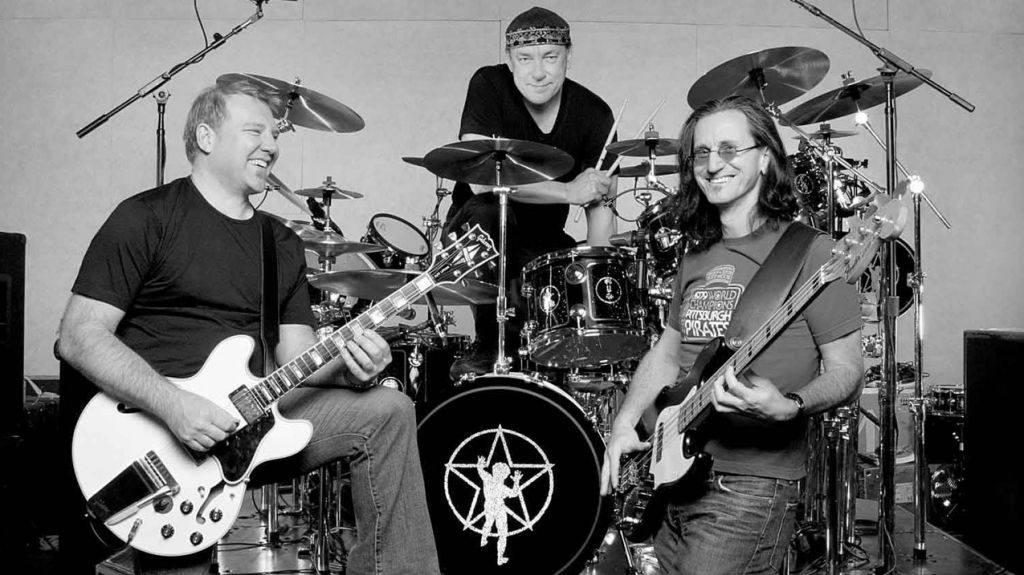Well we've done Rush in the 70s and Rush in the 80s, so it's only right that we turn our attention to the last phase of the band's amazing career.
Everyone's got their favourite era, and whilst popular opinion might suggest that all Prog readers favour the 70s, the era of sci-fi, sword and sorcery and those Kimonos. But the 80s, the era of the mullets, rolled up jacket sleeves and keyboards has plenty of fans as well.
Or, if you're like the Prog editorial team you like Rush per se. Every era has some great songs, and some not so great, And here are a selection of the of the finest Rush songs from the 90s and beyond. Enjoy...
Dreamline (from Roll The Bones, 1991)
After the slightly stuttering Presto, Rush regrouped for their fourteenth album, the much more solid Roll The Bones. The astronomy-referencing Dreamline opened the album with it's punchy guitar riff, as well as being the first single. The song proved so popular it remained in the band's live set until 2011's Time Machine tour.
Bravado (from Roll The Bones, 1991)
The more gentle Bravado was a positive song of hope on Roll The Bones and proved to be another live favourite, featuring a delightful melodic solo from Alex Lifeson. It also didn't feature a rap sequence, as the album's title track did. Which certainly raised the hackles of some purists.
Animate (from Counterparts, 1993)
"I love Animate. I think it’s one of the great songs we've done." Thats what Geddy Lee has to say about the opening track (and fourth single) from the band's 1993 album Counterparts. The album continued the rockier approach of Roll The Bones as the band returned to producer Peter Collins, having worked with Rupert Hine on the two previous albums.
Nobody's Hero (from Counterparts, 1993)
A more reflective and personal lyric from Neil Peart which dealt with the death of a close friend to AIDS. "He prevented me from ever being homophobic," Peart has said. The song featured a string section conducted by composer Michael Kamne, at the suggestion of producer Peter Collins. It was the third single taken from the album.
Driven (from Test For Echo, 1996)
Driven was written by Geddy Lee and uses three different bass tracks. It also formed part of Geddy's bass solo when performed live, although nothing from Test For Echo has been played live since 2005's R30 tour. Driven by an insistent Lifeson guitar riff and boasting a melodic refrain, the song also had a promo video mixing band action sequences woth madcap sci-fi scenes.
One Little Victory (from Vapor Trails, 2002)
Ah, Vapor Trails. The return of the band to activity after the tragedies that befell drummer Neil Peart, but also an album whose mix annoyed fans (the band going so far as to remix the album in 2013. One Little Victory was the opening track, its propulsive drum intro from Peart and insistent riffing from Lifeson, designed to herald the band's return with intent.
The song opened the second half of the band's set on the Vapor Trails tour of 2002. The song also featured on the soundtrack for the video game Need For Speed: Hot Pursuit 2.
Far Cry (from Snakes & Arrows, 2007)
There'd been five years between studio albums when Snakes & Arrows saw the light of day, with only the covers EP Feedback released in 2004, so understandably Rush fans were getting a little tetchy about the band's future. The minute they heard first single Far Cry, with its twisting rhythms and more proggy sound, all fears were allayed.
Armour And Sword (from Snakes & Arrows, 2007)
Inspired by the Victorian poet Matthew Arnold's poem Dover Beach, this mid-tempo track from Snakes & Arrows is an other example of how producer Nick Raskulinecz helped revitalise the band on their final two studio albums. A brooding mid-tempo song that looks at that which we protect ourselves we also use to hurt others, the song explodes into life with a searing Lifeson guitar solo half way through.
Caravan (from Clockwork Angels, 2012)
Caravan showed no let up in musical the renewed adventurism that typified the last studio albums of the band's epic career. It sounded great played live as well. The song, along with its b-side BU2B, were performed ahead of the album's release on 2010's Time Machine tour.
Headlong Flight (from Clockwork Angels, 2012)
And finally, the second single from Clockwork Angels, Headlong Flight nods deliberately back to the band's past, in particular 1975's Bastille Day. while sounding very much part of Rush's then present. The song was "a joy to write and record from beginning to end," according to Lee. Peart included a short drum solo, entitled Drumbastica, during live performances on both the Clockwork Angels and R40 tours.
The Garden (from Clockwork Angels, 2012)
The final track, from the final Rush studio album, the sombre, reflective The Garden serves as a fitting end to the band's recording career, and is lent even more poignancy with lyricist Neil Peart's tragic death eight years later. The track originally featured sampled strings, but in the end veteran string arranger David Campbell was brought in to orchestrate the song.
